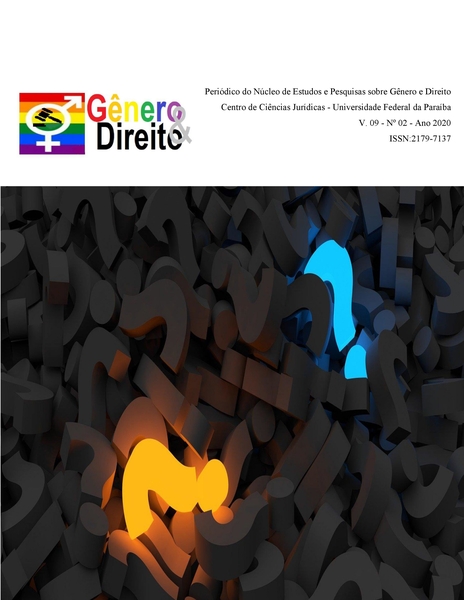LEGALIZATION OF NON-TRADITIONAL MARRIAGES AS A FACTOR UNDERMINING THE MORAL BASIS OF THE FAMILY AND LEADING TO THE REJECTION OF CHRISTIAN VALUES
DOI:
https://doi.org/10.22478/ufpb.2179-7137.2020v9n2.50866Palavras-chave:
LEGALIZATION OF NON-TRADITIONAL MARRIAGES, THE REJECTION OF CHRISTIAN VALUES, TRADICIONAL FAMILYResumo
The goal of this research article is to demonstrate that non-traditional marriages not only undermine the moral basis of the institution of the family, and lead to the rejection of traditional values. In order to examine this problem, comparative analysis was chosen as the main research method. Through the exploration of international experience and comparing legal norms, repeating the same mistakes in the area of domestic law and judicial practice can be avoided. This approach also facilitates the assessment of the effectiveness of solving various problems of law enforcement associated with the institutions of marriage and as a consequence, family in modern society. Additionally, the authors employed some other general and private scientific methods. Based on the findings of this work, the following conclusions were drawn: non-traditional marriage is a relationship in which the number of participants, their gender, the method of marriage registration, as well as the method of choosing a partner differ from the generally accepted standard of “the man and the woman” to meet sexual interests and needs of the participants. It is noteworthy that family is the basis of the state, national identity, and cultural development. Without a family in its traditional sense, it is impossible to preserve traditions and to pass them on from one generation to another. Therefore, it is imperative for us and our legislators to seriously consider the legalization of the concept of non-traditional marriages so that they are prohibited and the individuals who are looking to enter into such marriages are persecuted, since these newfangled Western trends are aimed at the destruction of state values and the inexorable degradation of the state itself.
Downloads
Referências
Flavius, I. (1544), Jewish Antiquities 3.12: 1.
Gottman, J., Levenson, R. (2003), “Observing gay, lesbian and heterosexual couples’ relationships: Mathematical modeling of conflict interaction”, Journal of Homosexuality, 45(1), 65-91.
Herek, G. (2006), “Legal recognition of same-sex relationships in the United States: A social science perspective”, American Psychologist, 61(6), 607-621.
Is homosexual marriage the “golden rule” for marriage? Retrieved from: http://www.origins.org.ua/page.php?id_story=1605#ixzz4ZaWmCDao
Kochetkov, I. (2013), “Expert: Russia will have to recognize same-sex marriage or “say goodbye” to the Council of Europe”, retrieved from: http://www.rosbalt.ru/piter/2013/04/10/1116227.html
Moscow Patriarchate (2000), Basics of the social concept of the Russian Orthodox Church. Department for External Church Relations of the Moscow Patriarchate. Moscow: “1st Model Moscow Printing House”.
Novikov, A. (2008), “Family 2020”, retrieved from: http://echo.msk.ru/programs/futureback/549062-echo/
Pravoslavie.ru, official website http://www.pravoslavie.ru/
Putin, V.V. (2013), “Putin opposes attempts to equalize traditional and same-sex marriage”, retrieved from: https://ria.ru/valdaiclub_anniversary_session/20130919/964434704.html
Titshaw, S. (2012), “The Reactionary Road to Free Love: How DOMA, State Marriage Amendments and Social Conservatives Undermine Traditional Marriage”, West Virginia Law Review, 115(1).
Trandafir, М. (2014), “The effect of same-sex marriage laws on different-sex marriage: Evidence from the Netherlands”, Demography, 51, 317-340
Yakovleva, E. (2013), “Shutting the door on same-sex marriage”, Russian Newspaper, May 22, 2013

